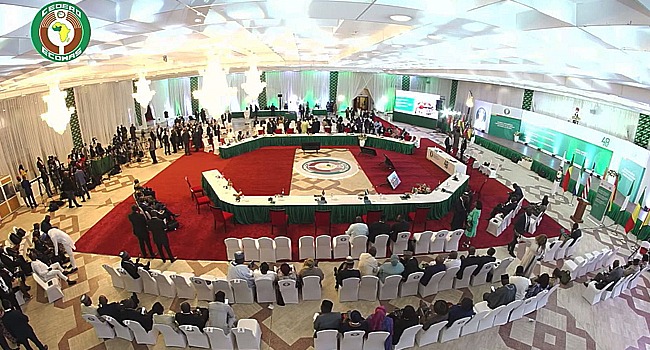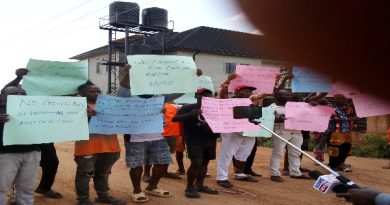WA leaders meet in Abuja for crucial talks to address security challenges; Diplomat cautions ECOWAS on Niger, Mali, Burkina Faso
Leaders from West African states gathered in the Nigerian capital, Abuja, Sunday for the 64th Ordinary session of the Economic Community of West African States (ECOWAS) Head of State and Government, a crucial summit aimed at tackling pressing regional crises.
This is the second gathering of the region’s leaders since August, and it comes as security challenges continue to riddle the bloc.
August’s meeting focused on Niger’s tumultuous situation following the July 26 military coup, which unseated Mohamed Bazoum from the presidency.
Since his ouster, Bazoum has been confined to his residence in the capital, Niamey.
Responding to the developments in Niger, ECOWAS leaders not only threatened military intervention but also implemented hefty economic and financial sanctions on Niger, – currently under the rule of General Abdourahamane Tiani.
The West African bloc committed to restoring constitutional order, applied financial and economic sanctions. However, in a swift turn, it’s president Omar Touray, speaking at the summit’s opening on December 10, revealed breaches in the sanctions.
“Despite our successful application, concerns arise from breaches, including substantial movement of cash across borders,” Touray stated.
Among the fifteen ECOWAS member countries, four — Mali, Burkina Faso, Niger, and Guinea — have been under military rule since 2020 due to coups d’état, leading to their suspension from the organization. Notably, these nations are absent from Sunday’s summit.
Meanwhile, President Tinubu and chairman of ECOWAS has charged leaders of the West African block to stand against unconstitutional change of government.
Speaking during the opening ceremony of the 64th ordinary session of the ECOWAS Authority of the Heads of State and Government in Abuja on Sunday, President Bola Tinubu encouraged ECOWAS members to remain committed to ensuring that democracy remains the only form of governance in the sub-region.
The three aforementioned countries, grappling with jihadist violence, have united under the Alliance of Sahel States (AES).
Another ECOWAS member, Sierra Leone, faced a recent failed coup, resulting in the tragic loss of over 20 lives, as reported by state officials.
A former Ambassador and Deputy Head of Missions Embassy of Nigeria in Washington DC, Ambassador Hassan Mohammed, has called on Economic Community of West African States (ECOWAS) to adopt a cautious approach in dealing with the recent developments in Niger Republic, Mali, and Burkina Faso.
In an appearance on Channels Television’s Sunrise Daily on Monday, Ambassador Mohammed, who is a member of the Board of Trustees (BOT) of the All Progressives Congress Professionals Forum, said the three countries feel offended by ECOWAS and have formed an association in reaction to the sanctions imposed on them.
“Niger, Mali and Burkina Faso — they are forming what they called the ‘Sahel association’. They are only sanctioned, they have not been driven out of ECOWAS. They are still members but have been suspended,” he said.
Mohammed recommended a diplomatic approach to dealing with this development.
“What I want to suggest to the ECOWAS leaders is that they tread softly. These guys take it as if they have been offended — that is their understanding because the whole West African government condemned the coup and they have the right to condemn because it’s ECOWAS, EU and all over the world.”
He stressed the need for diplomatic engagement, acknowledging the challenge these countries face after the condemnation from various international bodies.
When asked about the possibility of ECOWAS being fractured, the diplomat acknowledged the risk but commended the current approach taken by ECOWAS leaders, emphasising the importance of prioritising ECOWAS unity over the Sahel association.
The stakes are high as ECOWAS leaders strategize to address these multifaceted challenges and ensure regional stability.




